The Harris Federation Languages Subject Network
Working as a Languages teacher at Harris Federation means you will automatically benefit from the advantages of being part of a professional network of over 160 Languages teachers spanning some 29 departments and covering Spanish, French, Chinese, German, Italian, and Community languages.
We wanted to highlight some of the advantages of being part of a supportive network that is committed to celebrating all language learning and flying the Modern Foreign Languages (MFL) flag.
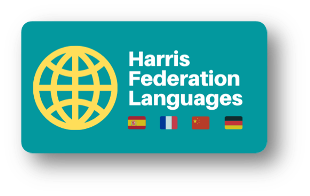
A focus on subject-specific Continued Professional Development
We firmly believe in the importance of subject-specific training that is relevant to practice, is an effective use of staff time and that draws upon the skills and expertise of everyone in our network. Our Initial Teacher Training with PGCE Languages course and Early Career Teacher sessions have a strong subject focus and we extend this approach to our Languages Network by way of:
- Half-termly Languages Network Meetings (a mix of online and face-to-face). These are our regular forums for staff to meet, share best practice, receive MFL community updates, CPD opportunities, moderate student work, and cover the MFL matters of the day.
- October 1-day Conference (face-to-face). An all-Harris Federation staff event at the ExCeL London. This is language-specific training and often includes keynote speakers (previously Rachel Hawkes, Steve Smith, and Joe Dale have presented at our conferences).
- February 1-day Conference (face-to-face). Same as October but the Languages network is based in one Harris Federation academy, with an increased number of sessions in-subject and covering Key Stage 5 teaching.
- Twilight Series (online). Snappy 30-minute optional twilights on topics requested by staff or on the expertise within our network. Previous sessions have included Tech for MFL teachers, supporting Community Languages, the Stephen Spender Prize poetry in translation, running the MFL Spelling Bee and many more.
- Curriculum Planning Days (face-to-face). In the summer term, language leaders and teachers meet with the central Languages team to collaborate on curriculum and resource review and plan ahead for the following academic year. This is particularly important with the incoming reformed GCSE which also require changes at Key Stage 3.
- External presenters and training (ad hoc sessions, as required). For example, previously we have had training days by Stephen Glover on teaching film/literature at Key Stage 5 after teachers noticed students were struggling with Paper 2, had training delivered by Gianfranco Conti, exam boards have delivered unit-specific training and, more recently, presented their new 2024-26 GCSE specifications.
- Valuing Network Contributions. We know there are varied ways to arrive at success and that the strength of our network comes from the rich practice and ideas that emerge from across our different contexts. This is why we encourage best practice sharing from everyone within the network from trainees to experienced Heads of Department. This takes various forms such as conference Teachmeet sessions, collaborative curriculum planning days, network meeting spotlights on practice CPD sessions run by school-based practitioners and sharing via our Microsoft Teams groups and Languages Network email group.
Here is what some of our network have said about the subject-specific training they have participated in:
5/5 “Great ideas that we can use in lessons - I have been using the strategies for the 90 word question this week with my year 11.”
5/5 “[The training had] carefully thought through how we can impact students most at this time while managing high workloads, thank you for maximising the impact of the [GCSE: Tackling the productive skills] session.”
5/5. “I really enjoyed the [A-Level paper 2] session. It was really useful to have an introduction to teaching literature and some great ideas for building students' knowledge from the ground up as well as an opportunity to moderate some exemplars.”
Teachers’ feedback, Harris Languages Network Conference 2024
Another training strength of our subject network comes from being able to support the leadership of Languages and our staff’s career development. This is thanks to the extensive leadership training offer at Harris (e.g. through the School-Led National Professional Qualifications) and the increased opportunity for career progression we are able to offer as a large group of connected Languages departments.
A focus on saving teachers time and sharing - not reinventing the wheel!
Our network is keen to keep abreast of subject developments, innovate and develop practice. We know this can happen most readily when teachers aren’t spending their precious time reinventing the wheel unnecessarily or typing out vocabulary lists from scratch. To help free up our teachers and leaders we:
- Provide an optional central Languages curriculum and all associated curriculum plan documentation.
- Provide key lesson resources, activity templates, vocabulary lists, knowledge organisers, sentence builders, storybooks and cultural resources for use, adaptation or reference.
- Provide assessments in Listening, Reading, Speaking, Writing and Grammar at 2 points in the year. There is a focus on these being designed to be efficient to administer and easy to mark (e.g. through smart marking targets and error prediction).
- Benefit from economies of scale with regards to purchasing languages resources such as textbooks or digital platforms.
- Provide data templates and Languages-specific support for excel and MIS.
- Follow the same GCSE and A-Level exam boards. This allows for a common language between the staff of our network, increases training availability/impact and reduces the number of Languages teachers creating things from scratch and working in silos.
- We encourage staff to independently build connections with one another for support and sharing.
- We cascade ideas and best practice from one context to the wider group to support with improving practice and reducing workload.
Dylan Wiliam has said that “everything works somewhere, nothing works everywhere”. This is why our central curriculum is optional, why we strongly encourage adaptation, collaborate on curriculum review and we do not believe in a prescribed pedagogy.
That said, we do find that the vast majority of our departments do opt in to follow our central curriculum as it has been improved, refined and resourced over time, has been carefully sequenced, undergone multiple successful Ofsted Deep Dive inspections and supported many thousands of students to be successful in and enjoy their languages study.
A focus on Languages advocacy
Our network works hard to raise the profile and importance of our beloved subject at all levels: with Federation leadership, principals, school senior leadership, MFL line managers, governors, students, and parents.
We also participate externally at conferences, for example with the Association for Languages Learning subject association and through a range of other language-related initiatives and projects. The hard work of our passionate teachers combined with this advocacy work are what have led to the significant growth of Languages as a subject across our schools, well in excess of the national average, as is evident in the data below.
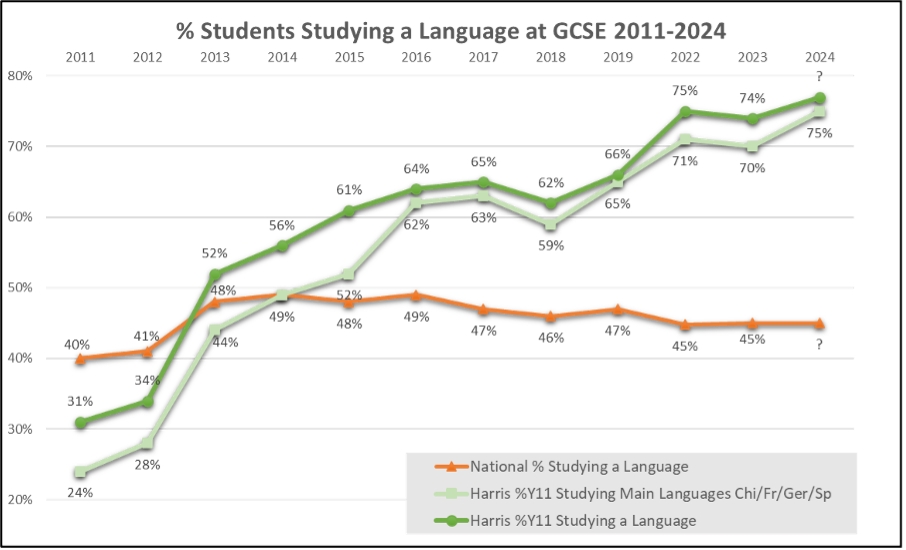
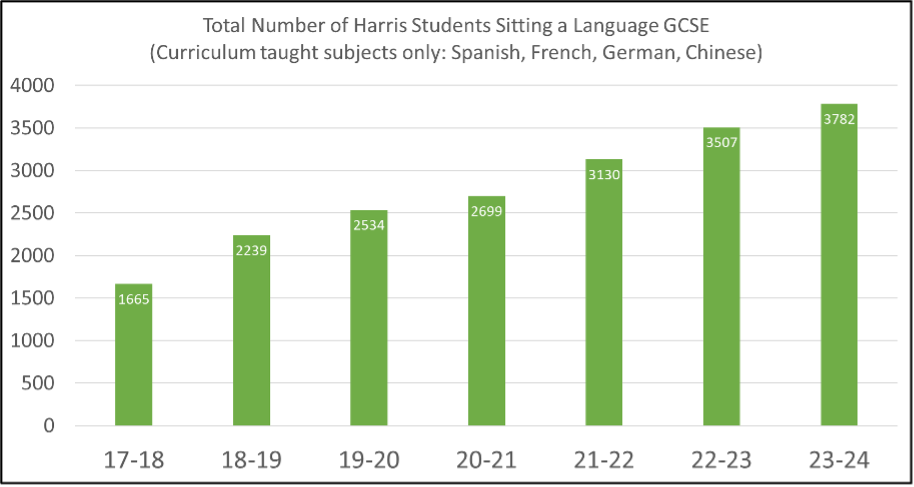
Our network keeps abreast of subject developments and as a group we are well placed to understand emerging research, policy changes and MFL-specific issues and challenges. As a group we have a voice with school leadership so we are able to make sure our leaders (who may not be MFL-specialists!) are aware of and can support with challenges particular to our subject such as harsh grading in MFL, tiering decisions, speaking exam logistics and organising trips.
A focus on bringing Languages to life
We offer a wide range of resources to support our languages teachers bring the curriculum to life at all Key Stages. As well as the comprehensive, adaptable central curriculum, weekly centrally-planned lesson resources and assessment material, we offer a variety of engaging material to celebrate cultural aspects and events, termly meaningful project tasks and storybooks to foster a love of reading in the target language.
This year, we have started a network-wide penfriend project across our academies, enabling our students to write letters to each other in the language they study.

Our vibrant network is made up of passionate teachers and students who love nothing more than learning about languages; each year, we run four network-wide competitions that are hugely popular:
- The Idioms Calendar Competition - a celebration of quirky and funny idiomatic expressions from all over the world to celebrate European Day of Languages on the 26th of September.
- LinguaChef - a culinary competition for which students cook a special dish from anywhere around the world and design a poster to share recipes, photos and information about the dish.
- MundoVision - a singing competition, inviting all talented musicians and singers to sing a song in a foreign language. The standards of performance are Eurovision-worthy!
- Spelling-Bee Grand Finale – final of the in-school Spelling Bee round, which sees students in French, Spanish, German, Italian and Mandarin Chinese battle it out against one another in individual and group categories.
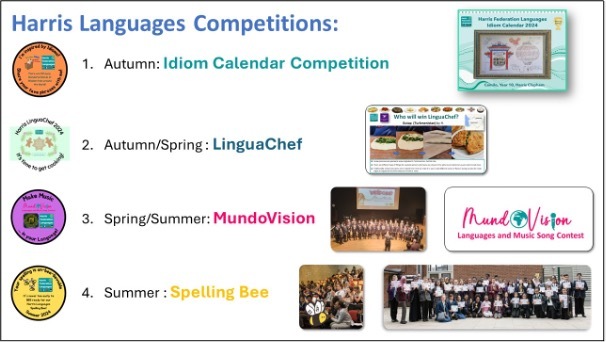
To add to our rich promotional and cultural provision, we also participate in external events every year. Whether a careers event about languages, a webinar on “Why Languages?” by the British Council or nation-wide competitions such as the Stephen Spender Prize and the Anthea Bell Prize for Young Translation, we aim to offer many opportunities for our students to enjoy languages outside the classroom and foster their interests to study them further.
Our new Future Linguist Club is an exciting programme that talented and curious linguists can join. They can choose to learn any language, we will guide them in their independent study, provide them with an international penfriend to communicate with, organise languages competitions every term on Duolingo, offer languages masterclasses after school and 6 online sessions a year, during which we solve linguistic puzzles, plan a research-based project, and talk to languages graduates and professionals about their experiences. These are the students we want to particularly encourage towards choosing to study a language at Key Stage 5 and beyond at university.
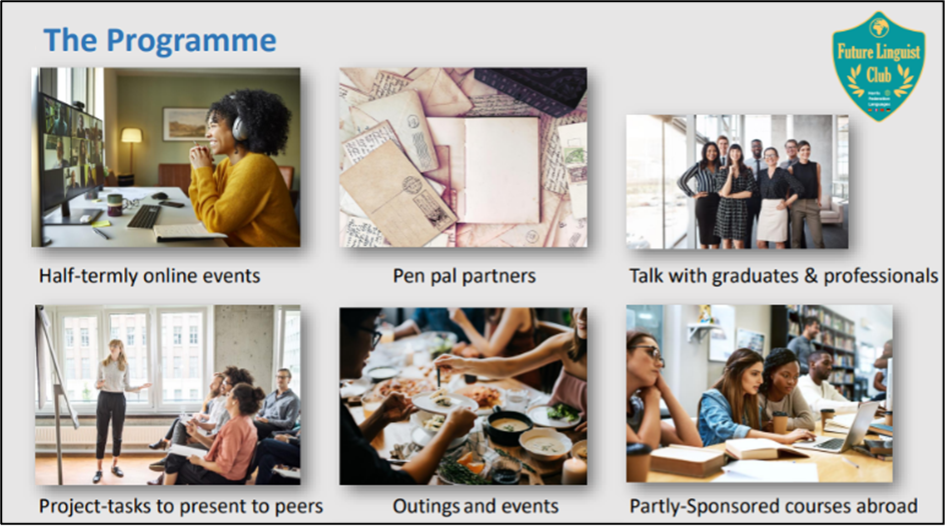
Last, but certainly not least, we encourage departments to offer a range of trips to their students, including day trips to the British Film Institute for study days and screenings of international films or the National Portrait Gallery, reward trips to a French, Spanish or Chinese restaurant in London, residency trips abroad and cross-curricular trips with PE (ski trip), History (Verdun) and Geography (Iceland). We are always keen to support academies with organising trips and provide risk assessment template documents and guidance.
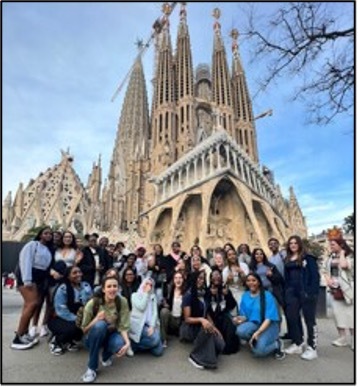
A focus on support from experienced practitioners
As well as the benefits of our network above, you or your department may also have in-school support from one of our Harris central subject consultants. These are passionate and experienced Languages teachers who work across our Federation supporting all things Languages. They may work directly with students, teachers, heads of Department or leadership in your school and they also coordinate the Languages Network and training offer.
They love nothing more than discussing their subject with colleagues and can support with everything from how to manage a tricky class, how to optimise Target Language use, how to teach a particular grammar point or how to conduct a speaking exam, to running our Harris MFL Spelling Bee or planning an international trip.
Consultants are extremely knowledgeable and supportive. Every single member of MFL benefits from their expertise in some way (including PGCE trainees). I specifically feel I have developed hugely as a leader owing to their coaching and mentoring. We couldn't ask for better support.
Catherine Hilldrup, Head of Languages at Harris City Academy Crystal Palace
We have had consultants teach lessons in the absence of staff, provide extra support/sessions to boost progress among key student groups (both in term-time and during holidays), support middle leaders in the development of Teaching & Learning across department, create and then share valuable resources, conduct community language assessments. All of these interventions have been exceptional in quality and have had meaningful impact on students and staff.
Stuart Crow, Faculty Director at Harris Girls' Academy Bromley
Supportive guidance and expert advice as I took on a new role. They provided expert teaching to enable small group teaching for greater impact in the classroom in the upper school and their knowledge of a wide range of resources really supported teaching and planning. They support with training all members of staff in the team from ECT2 and FLA to HOD. A role model.
Hannah Smith, Languages Head of Department at Harris Invictus Academy Croydon
To get a further flavour of the Harris Federation Languages Subject Network, see @HFLanguages on X (formerly Twitter). If you're interested in working with us, see our current Languages teaching and leadership vacancies.
Should you have any questions about the Harris Federation Languages Network, contact David Shanks and Julien Violette.
Connect with us…
and stay up to date with all things Harris Careers!




